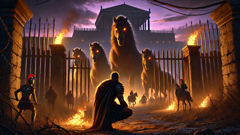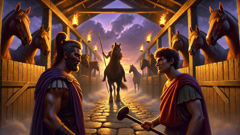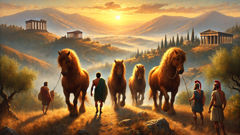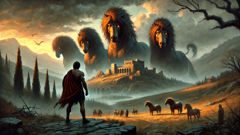Introduction
In the shadowed annals of Greek myth, among the glimmering exploits and impossible labors that shaped the legend of Heracles, none burn with quite the same savage intensity as the tale of the Mares of Diomedes. The air in Thrace was thick with salt and blood, its winds carrying the echoes of hoofbeats and the haunted screams of those who dared wander too near the stables of King Diomedes. To the people of Thrace, the mere mention of these horses chilled the marrow: four monstrous mares, each larger than any beast bred by mortals, their eyes red as coals, their breath reeking of carrion. These were no ordinary animals. Their teeth were sharpened by a cruel hand, their appetites twisted by a king’s madness, so they craved flesh—human flesh, above all. Legends spread across the Aegean, tales whispered in markets and at campfires, of travelers vanishing on the borderlands, of a land ruled by terror and the ceaseless thunder of monstrous hooves. The name Diomedes grew infamous, spoken with fear and disgust from Attica to the far isles. It was into this world, thick with dread, that Heracles strode—undaunted by monsters or men. The son of Zeus had already bested the Nemean Lion, subdued the Hydra, and captured the Ceryneian Hind; but this labor, the eighth, would demand more than brute strength. This was a test of courage, ingenuity, and the ability to face the darkness that dwells not only in the wilds, but in the hearts of mortals. Guided by stories and omens, armed with little more than his club, bow, and his unyielding resolve, Heracles journeyed east. He knew only that he must seize and bring back the mares alive—a task that many would call impossible, even for one favored by Olympus. Yet Heracles was driven by more than divine decree. Each labor was a step towards redemption for the rage and madness that haunted his past. The road to Thrace would test not just his body, but his soul. As he walked the wind-scoured coastlines and entered lands where strangers eyed him with suspicion, Heracles found that every tale about Diomedes’ reign was true—and that the mares were not merely beasts, but a living nightmare, as cunning as they were wild. Here, in the blood-soaked fields beneath the harsh Thracian sky, Heracles would face a challenge that would echo through eternity.
The Road to Thrace: Omens and Shadows
The path from Tiryns to Thrace wound through lands that seemed to grow more hostile with each passing mile. Heracles moved steadily, his every step a silent dialogue with the gods who had both blessed and cursed him. He journeyed over rocky hills, through olive groves dappled with the first fire of autumn, and along shorelines where shipwrecks rotted half-buried in sand. The world felt old here, its stories stitched into every root and stone. As he walked, Heracles was seldom alone. The memory of his labors clung to him: the Nemean Lion’s unbreakable hide, still his cloak; the Hydra’s venom lingering in his arrows. But there were other shadows as well—the faces of those he’d lost, the madness Hera had once sent to drive him to unspeakable acts. Each labor was penance, a hope for peace that always seemed just beyond reach.

Word of his coming spread quickly through the border villages. Farmers would glance up from their fields and children would gape, half in awe, half in terror. Many had kin who vanished near the domain of Diomedes. Some gave Heracles bread or wine, muttering prayers for his soul; others warned him to turn back. “The king is no mortal man,” an old woman rasped one twilight, her eyes milky with fear. “He was raised by Ares himself. And the mares—they’re not of this world.”
Heracles listened. He asked about the horses. Each story was worse than the last. The mares of Diomedes, known as Podargos, Lampon, Xanthos, and Deinos, were said to have been born from nightmares. Their manes were matted with gore, their hooves could shatter stone, and their hunger never waned. They devoured any who came near—their handlers, travelers, even soldiers sent to subdue them. Diomedes, giant among men, delighted in their savagery. He would feed prisoners to his horses to punish dissent and terrorize his people into obedience. The land suffered beneath this cruelty; villages fell silent, fields went untended, and hope withered like a frostbitten vine.
Nights in Thrace were thick with unease. Fires burned low, and every wind seemed to carry a distant, hollow scream. Heracles set his camp on the edge of a forest, close to the plains where the stables lay. He watched the sky: storm clouds gathered, the moon veiled by shifting mists. On the second night, as Heracles dozed near the embers of his fire, he was startled awake by a vision. In the flickering light, he saw the mares—huge and spectral—galloping through fields strewn with bones. Upon their backs rode the shades of men long dead, their faces twisted in agony. As Heracles reached for his club, the vision faded, leaving only the echo of distant hoofbeats and the certainty that this labor would demand every ounce of his will.
He rose before dawn and pressed on toward the heart of Diomedes’ realm. The sun broke over the horizon, painting the land in crimson and gold. Ahead loomed the stables—massive, surrounded by fences as tall as a man, with guards pacing nervously outside. Beyond, the palace of Diomedes reared up against the sky, its banners snapping in the wind. Even from a distance, Heracles could see the mares moving restlessly within their enclosure. They seemed aware of his presence—heads raised, nostrils flaring, muscles rippling beneath bloodstained hides. For a moment, Heracles hesitated. He’d faced monsters before, but these beasts were twisted by man’s cruelty. This was not just a test of strength—it was a confrontation with a darkness born from mortal hands.
He waited until twilight to approach, melting into the long shadows cast by the stables. Each step was measured, every sense alert to danger. The guards muttered among themselves, fearful even in numbers. Heracles studied their movements, noting gaps in their patrols and the places where the wall had begun to crumble. His mind raced with possibilities: how to distract the soldiers, how to calm the mares, how to keep them from turning their savage hunger upon him. Above all, he wondered what manner of man could rule by such terror—and what price he’d pay to see this labor through.
The Wrath of Diomedes: Confrontation and Chaos
The first move in any battle is not always a blow, but a choice. Heracles waited for darkness, watching the rhythm of the guards and the restless agitation of the mares. The wind changed; he caught the stench of blood and fear from the stables. He’d seen lions with such eyes—creatures driven mad by hunger and pain. Heracles gripped his club and crept along the edge of the wall, silent as a hunting wolf.

He found a section of rotted timber and pressed his weight against it until it cracked softly. A gap widened—just enough for him to slip inside. The mares sensed him immediately. Podargos, the swiftest, reared up, eyes burning like embers. Lampon snorted and pawed the earth; Xanthos and Deinos circled with heads lowered, teeth bared. Heracles stood his ground, heart thundering. He spoke in low tones, recalling the wisdom of centaur Chiron: how to calm wild things, how to let them smell your courage and your pain.
Suddenly a shout rang out. A sentry had spotted movement. Torches flared; arrows hissed through the night. Heracles darted for cover behind a feeding trough. The mares panicked—hooves thundered, jaws snapped. A guard tried to drive them back with a spear but was knocked aside, his scream ending abruptly beneath Podargos’ crushing kick.
The chaos drew Diomedes himself from his palace—a giant of a man, towering above his soldiers, clad in blackened bronze. His eyes were hard as flint. “Who dares disturb my beasts?” he roared. His gaze fell on Heracles, and a cruel smile creased his lips. “Ah, the famed son of Zeus. I wondered when you’d come for my treasures.”
Heracles met the king’s gaze. “The time of terror ends tonight, Diomedes. These mares have feasted on innocent blood for too long.”
Diomedes laughed—a sound like boulders breaking. “You think yourself a hero? You’re a fool! The gods themselves favor my house. Ares taught me to rule by fear. My mares are my justice!”
The soldiers closed in, emboldened by their king. Heracles fought with savage efficiency—his club sending men sprawling, his arrows whistling through the night. The mares, caught in the frenzy, trampled those who faltered. The ground turned slick with mud and blood. In the chaos, Heracles saw an opening: Diomedes was separated from his men, sword raised, bellowing for order.
They clashed in the heart of the stable yard—hero and tyrant, strength against brutality. Diomedes was strong, but Heracles fought with purpose beyond rage. They grappled, trading blows that shook the earth. At last, Heracles seized Diomedes and, with a mighty heave, hurled him into the enclosure.
The mares turned at once—sensing their tormentor within reach. Diomedes tried to command them, but there was no more fear in their eyes, only hunger. The mares descended on him in a frenzy, their vengeance swift and terrible. In moments, the tyrant was gone. The horses, sated at last, grew calm—the madness fading from their eyes.
Heracles stood among the stunned survivors—guards cowering, servants weeping in relief. He knew his work was not done. The mares, though quiet now, remained dangerous. He fashioned heavy chains from the king’s own stores and led the horses from their prison. Their heads hung low; they followed him without resistance.
As dawn broke over Thrace, word spread that Diomedes was dead and his reign ended. The people emerged from hiding, awestruck by the hero who had delivered them. Heracles said little. He tended his wounds, gave thanks to the gods, and prepared for the long journey home, four monstrous mares in tow. The hardest part was over—or so he thought.
A Hero’s Burden: The Long Road Home
The journey from Thrace to Tiryns was long and fraught with peril, even for one such as Heracles. The mares were still unpredictable—calm for a time, then wild as the winds that swept across the northern plains. Chained together with iron links forged from Diomedes’ own armory, they strained against their bonds. Heracles led them by day and tethered them securely by night, always alert for signs of hunger or unrest.

Word of Diomedes’ death raced ahead of him. In every village he passed, people greeted Heracles with awe and gratitude. Some pressed offerings of bread, cheese, or honey into his hands. Others brought gifts for the mares: armfuls of barley or handfuls of salt, offered with trembling hands. The legend grew with each step—Heracles, the hero who had ended a reign of terror and tamed monsters born from cruelty itself.
But not all celebrated. Bands of Thracian warriors, loyal to Diomedes’ memory, haunted the hills and forests. More than once, they ambushed Heracles as he led the mares along narrow mountain paths or through shadowed ravines. The battles were fierce. Heracles fought with relentless energy—sometimes wielding his club, sometimes using only his fists and wits. The mares responded to violence with renewed agitation, snapping their jaws and trampling fallen enemies underfoot. It was as if the taste of blood still lingered in their memories.
One night, as Heracles camped beside a river, he was visited by a stranger—a gray-bearded man in a hooded cloak. He introduced himself as Phineus, an oracle who had once counseled kings. Phineus warned Heracles: “These mares are not merely beasts, but a curse upon the land. They carry the legacy of Diomedes’ madness. If you let your guard slip, they will turn on you.”
Heracles listened. He remembered Chiron’s lessons: that sometimes strength alone was not enough. He began to treat the mares not as monsters but as victims—creatures twisted by cruelty. He spoke to them as he walked, offering calm words and gentle touches when they showed restraint. Slowly, their wildness softened. The hunger in their eyes faded. By the time Heracles reached the foothills of Argolis, the mares followed him willingly.
Yet one last test remained. As he neared Tiryns, Hera sent a great storm to bar his way—lightning splitting the sky, rain lashing the earth. The mares panicked, rearing and straining at their chains. Heracles stood firm, holding fast to their leads until the storm passed. In that moment, he understood: courage was not merely defiance in battle, but patience and mercy in the face of chaos.
He arrived at Tiryns at sunrise, battered but unbroken. King Eurystheus greeted him with mingled fear and admiration. The mares were delivered as demanded, their chains removed under watchful eyes. Eurystheus hid behind a bronze shield, unwilling to face the creatures he’d ordered Heracles to fetch.
For a time, the mares were kept within royal stables—fed on barley and water instead of flesh. In time, it’s said, their madness faded completely. Some tales claim that Heracles released them on the plains of Argos; others say they wandered northward, free at last from the curse of Diomedes.
Heracles’ labor was complete. But more than another mark on his long list of deeds, he had learned something deeper: true heroism was not in vanquishing monsters, but in understanding and healing what evil had broken.
Conclusion
The tale of Heracles and the Mares of Diomedes lingers in the memory not only for its spectacle of violence and heroism but for the deeper truth it reveals about human nature. In facing beasts twisted by suffering—and a tyrant made monstrous by his own cruelty—Heracles was forced to look beyond brute force. The labor demanded a kind of courage that transcended physical might: the courage to show mercy, to recognize suffering even in those who seem lost to it, and to heal what others would simply destroy. The people of Thrace rebuilt their lives after Diomedes’ fall, learning that fear can be broken and hope restored, even in the darkest corners of the world. Heracles’ legend grew, not only as a slayer of monsters but as a bringer of peace—a reminder that the greatest strength lies in compassion as much as in valor. And so, as fires burned bright in the hearths of Greece and tales passed from mouth to mouth beneath the stars, the story of the eighth labor became a lesson for all: that even the wildest creatures can be tamed, that evil can be undone, and that redemption is possible for those who dare to confront both the darkness within and without.













